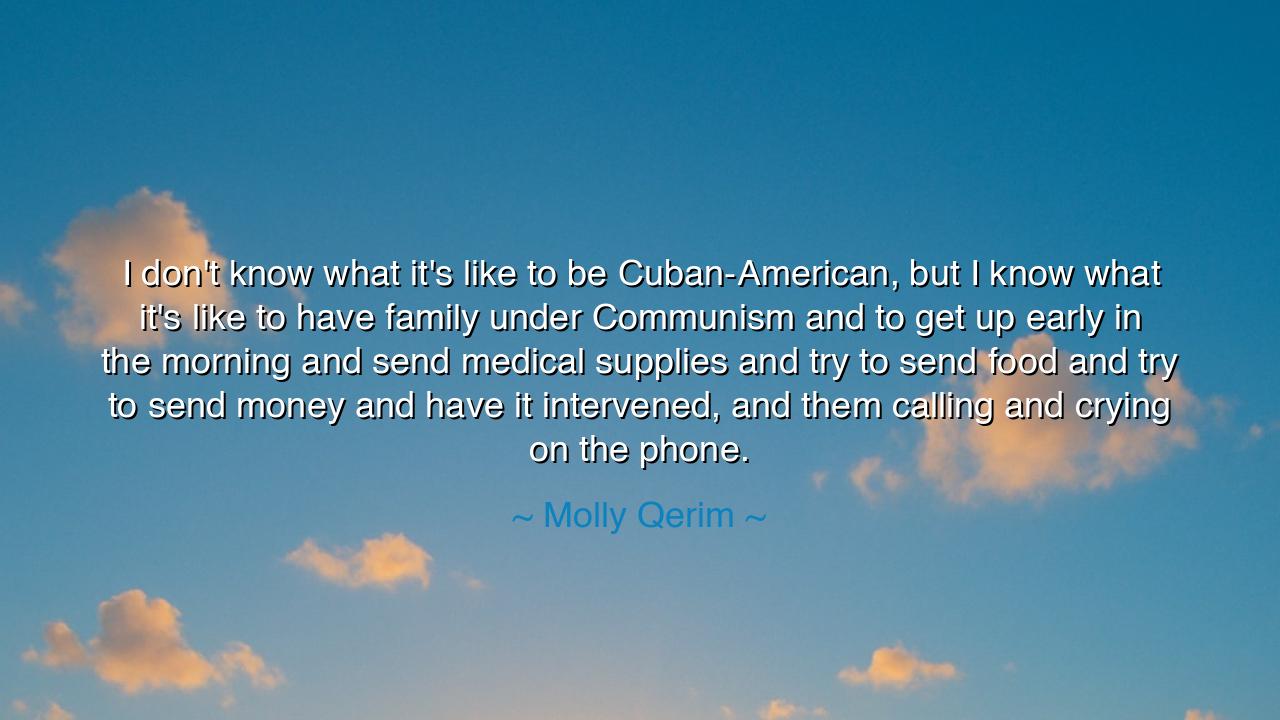
I don't know what it's like to be Cuban-American, but I know what
I don't know what it's like to be Cuban-American, but I know what it's like to have family under Communism and to get up early in the morning and send medical supplies and try to send food and try to send money and have it intervened, and them calling and crying on the phone.






The words of Molly Qerim tremble with the ache of remembrance and the fire of empathy: “I don't know what it's like to be Cuban-American, but I know what it's like to have family under Communism and to get up early in the morning and send medical supplies and try to send food and try to send money and have it intervened, and them calling and crying on the phone.” These are not the words of politics or ideology—they are the words of the heart, shaped by love and sorrow. In her voice, we hear the cry of millions who have watched their kin suffer under distant powers, their compassion bound by borders they did not draw. Her words speak to the sacred, universal pain of the divided family, and the eternal human desire to nurture, even when the world forbids it.
To understand her meaning, one must first see the heart of Communism, not as an idea written on paper, but as a lived condition in which the human spirit is both hardened and haunted. For in every nation where power grows heavy and freedom grows thin, it is the ordinary people who bear the weight—the mother denied bread, the father stripped of his trade, the child who grows up hearing whispers of a world beyond reach. Molly Qerim’s quote carries this inheritance of struggle, though she speaks not for her own nation alone, but for all who have watched loved ones trapped behind walls built of fear and control.
She speaks of the act of giving—of waking at dawn to send parcels of hope across invisible lines, of preparing medical supplies, food, and money, only to watch them vanish into the void of bureaucracy or tyranny. This act is more than charity—it is resistance, a form of love that defies distance. To send aid under such systems is to whisper across the iron curtain: “You are not forgotten.” Yet even such whispers can be silenced. To have these gifts intervened—confiscated, censored, erased—is to feel the cruelty of being cut from one’s own blood. Her words reveal the agony of helplessness, of watching from afar as loved ones suffer and cry on the phone, their voices carried through the static of sorrow and time.
History is filled with such cries. Think of the families torn apart by the Berlin Wall, which for twenty-eight years divided brothers from sisters, lovers from one another, children from parents. There are stories of mothers standing at the concrete barrier, weeping as they heard their children’s voices from the other side, unable to touch. Or of those who risked their lives to send letters, medicine, or even a single photograph to the imprisoned half of their hearts. The world may call such separation political—but to those who live it, it is deeply personal, a daily crucifixion of the soul.
What Qerim’s words uncover, then, is a truth deeper than ideology: that love is an act of endurance. To love someone under oppression is to love without guarantees—to give knowing it may be taken, to hope knowing it may be crushed. Her compassion extends beyond borders, beyond nations, reminding us that suffering has no nationality. Whether Cuban-American, Albanian, Ukrainian, or any other, the ache of the separated family is the same, the courage of the caregiver identical.
There is also wisdom in her humility—“I don't know what it's like to be Cuban-American,” she says, acknowledging that every story of struggle is its own. This humility is itself an act of unity. It tells us that empathy does not demand identical experience; it demands listening, feeling, and acting. Too often, people build walls of difference around their pain, as though empathy could only flow where stories match. Yet the ancients taught otherwise: that the sorrows of one are the call to compassion for all. To recognize another’s pain, even if it is not your own, is the highest form of understanding.
And so, my child of conscience, take this teaching to heart. When you hear of those who suffer in silence, do not turn away because you cannot feel their pain exactly. Let empathy be your bridge, and action your offering. If you cannot send medical aid, send kindness; if you cannot send food, send your voice to speak for justice. Support those who care for their families under hardship, who fight quietly each day against systems that divide and dehumanize.
For in the end, the lesson of Molly Qerim’s words is eternal: compassion is not bound by borders. The act of caring for the suffering—whether near or far—is the purest expression of humanity. To love despite obstacles, to give despite interference, to hope despite despair—this is how the spirit triumphs over tyranny. And one day, when the walls fall and the cries on the phone are replaced with laughter in the same room, it will be because hearts like hers refused to stop reaching across the distance.






AAdministratorAdministrator
Welcome, honored guests. Please leave a comment, we will respond soon